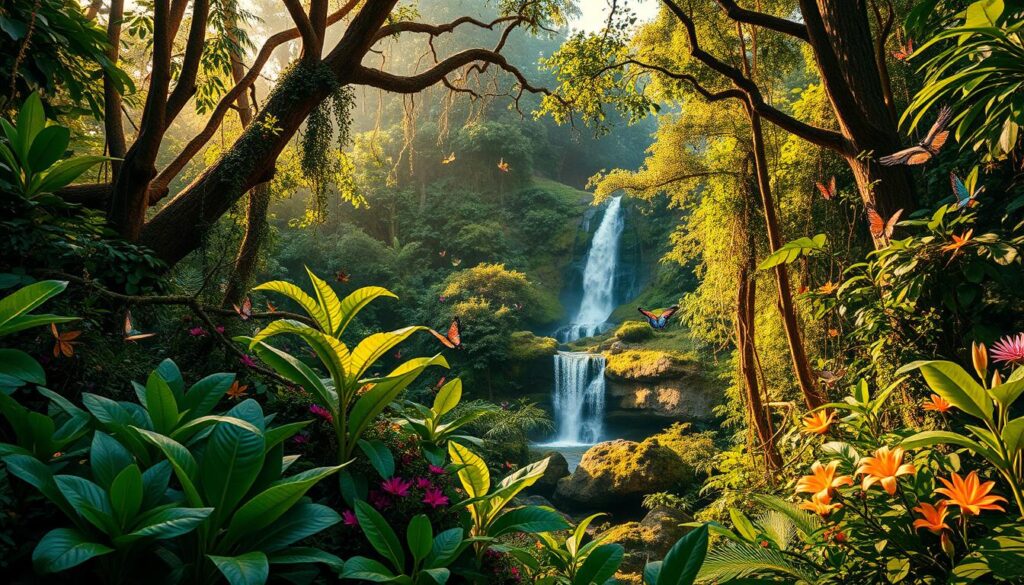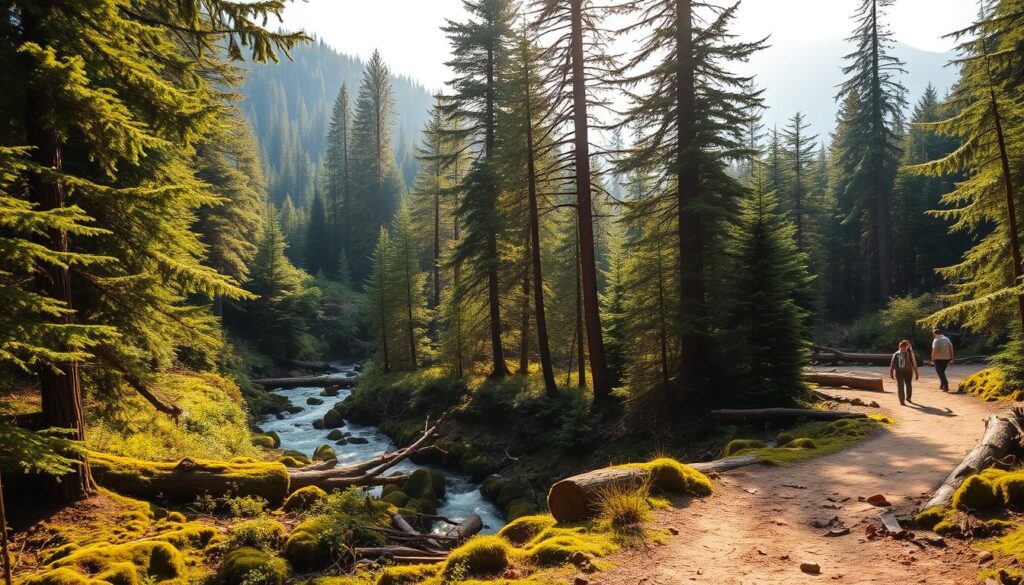What if you could step into a world where time stands still—a realm where ancient forests whisper secrets older than civilization? This UNESCO World Heritage Site cradled in Kerala’s Nilgiri Hills offers precisely that rare opportunity. Spanning 237 square kilometers of protected land, it shelters one of Earth’s last surviving tracts of tropical evergreen rainforest.
Your journey here unveils a living museum of evolutionary marvels. Over 1,000 flowering plant species carpet the landscape, while endangered lion-tailed macaques swing through canopy corridors unchanged for millennia. The air thrums with rare birdcalls rather than human noise—a true sanctuary where nature writes the rules.
This ecological treasure owes its intriguing name to local legends tracing back to the Mahabharata era. As you walk trails once trodden by mythical heroes, you’ll understand why scientists call it the “genetic goldmine” of the Western Ghats. Every moss-covered stone and trickling stream tells stories of survival against modern pressures.
Key Takeaways
- Protected UNESCO site spanning 89.52 sq km core area in Kerala’s mountain rainforests
- Contains India’s largest population of endangered lion-tailed macaques
- Over 1,000 flowering plant species create a botanical wonderland
- Forms the heart of Nilgiri Biosphere Reserve’s ancient ecosystems
- Blends mythological significance with cutting-edge conservation efforts
Overview & Quick Facts
Imagine unlocking a treasure map where every path leads to nature’s best-kept secrets. Nestled in Kerala’s Palakkad district, this ecological gem spans 237.52 sq km of tropical evergreen forests within the Nilgiri Biosphere Reserve. Its UNESCO World Heritage status since 2012 highlights its global importance as a biodiversity hotspot.
Table of Clarity: Key Information at a Glance
| Category | Details |
|---|---|
| Location | Northeast Palakkad, Kerala |
| Total Area | 237.52 sq km (Core: 89.52 sq km) |
| Nearest Access Points | 60km from Palakkad via Mannarkkad 69km from Palakkad Railway Station 91km from Coimbatore Airport |
| Contact | Wildlife Warden: 08589895652 Email: mail@silentvalley.gov.in |
| Best Seasons | August-September (Monsoon Magic) December-March (Dry Trail Days) |
Location, Size, and Environment
Your adventure begins where the Mannarkkad Plains meet the Nilgiri Plateau. This strategic position creates microclimates nurturing over 1,000 plant species. The protected zone acts as a natural bridge for wildlife migration across the Western Ghats.
Three distinct ecosystems thrive here: dense rainforests, grassy meadows, and high-altitude shola forests. Rangers often spot endangered species like the Malabar giant squirrel navigating these habitats. Pack your binoculars – 75% of Kerala’s butterfly species flutter through these canopies.
Experience the Silent Valley National Park

Prepare to awaken your senses in a living laboratory of biodiversity. This protected area reveals nature’s masterpiece through three distinct ecosystems – each hosting unique lifeforms found nowhere else on Earth.
Rich Biodiversity and Unique Flora Fauna
Your journey begins beneath emerald canopies sheltering 1,000+ flowering plants. Orchid enthusiasts will marvel at 110 varieties clinging to ancient trees – some blooms smaller than your thumbnail. The forest floor teems with medicinal herbs used by tribal communities for centuries.
Wildlife Encounters: From Lion-Tailed Macaques to Rare Species
Spot silver-maned primates swinging through treetops – this sanctuary protects India’s largest lion-tailed macaque population. Keep cameras ready for Malabar giant squirrels performing aerial acrobatics. Rangers often whisper about tiger sightings near watering holes at dawn.
Butterfly lovers rejoice – 200+ species create fluttering rainbows. “This is one of the last places where you’ll see endangered species thriving together,” notes a veteran naturalist. Listen for the Nilgiri tahr’s distinctive call echoing across cliffs.
Eco-Tourism and Jeep Safari Packages
Choose your adventure with flexible safari options:
- Couples: ₹2290
- Groups of 3: ₹2618
- Full jeep (6 people): ₹3600
Book offline at the forest office for buffer zone access through moist deciduous woodlands. Morning slots offer prime wildlife activity – guides recommend arriving 30 minutes early. Your fees directly support conservation efforts protecting these 400+ moth species and their habitats.
Journey, Trekking, and Adventure

Lace up your boots for trails that transform ordinary hikes into extraordinary discoveries. Whether you seek cascading waterfalls or wildlife encounters, this protected wilderness delivers heart-pumping adventures while safeguarding its ecological treasures.
Popular Trekking Trails: Karuvara and Keerippara
Choose between two distinct paths through evergreen forests. The 5km Karuvara route leads to thunderous waterfalls, perfect for cooling off after a 4-hour hike. Birders spot Malabar trogons and laughing thrushes flitting through moss-covered branches.
Prefer tracking wildlife? The Keerippara trail winds through buffer zone grasslands where giant squirrels leap between trees. Guides often point out fresh elephant footprints near streams – keep cameras ready!
Travel and Access: Reaching the Base Camp
Your adventure begins with a scenic 60km drive from Palakkad to Mukkali. Watch landscapes shift from rice paddies to misty hills as you approach the base camp. Secure permits online through Kerala Forest Department – they limit daily visitors to protect fragile ecosystems.
Plan trips between August-March for ideal conditions. “These trails let you experience nature’s rhythm firsthand,” says a local ranger. Morning starts ensure cooler temperatures and active wildlife sightings along both routes.
Conclusion
Your journey through this ecological marvel leaves more than footprints – it sparks lasting connections with Earth’s living heritage. As a UNESCO World Heritage Site, these evergreen forests shelter evolutionary wonders like silver-maned primates and 1,000+ flowering species unseen elsewhere. Every rupee spent on jeep packages (starting ₹2290 per head) fuels protection for endangered lion-tailed macaques and their shrinking habitats.
Choose between mist-kissed trekking trails or wildlife-focused buffer zone explorations. Well-planned routes from Coimbatore Airport or Palakkad District make adventures accessible without compromising the tropical evergreen ecosystem’s fragility. Morning treks reveal Malabar giant squirrels dancing through canopies, while dusk brings rare bird calls across the Nilgiri Hills.
You don’t just visit – you become part of conservation history. Sustainable tourism here safeguards the Western Ghats’ genetic treasury while offering transformative encounters. Pack your binoculars, book your pass, and witness why scientists call this India’s last living laboratory of untamed biodiversity.
FAQ
What’s the best time to explore the park’s lush evergreen forests?
Plan your visit between October and March for ideal weather. Post-monsoon months reveal vibrant greenery, while cooler temperatures make trekking trails like Karuvara and Keerippara more enjoyable.
How do I reach the base camp for adventure-packed treks?
Mukkali, the gateway to the park, is accessible via road from Palakkad (58 km). Coimbatore International Airport (120 km) offers the nearest air connectivity. Jeep rentals from Mukkali simplify the final stretch to the core zone.
Are permits required to spot lion-tailed macaques or rare birds?
Yes! Day permits are mandatory and available at the buffer zone office. Guided tours ensure safe wildlife encounters while protecting the fragile ecosystem. Book eco-tourism packages in advance during peak seasons.
Can I camp overnight inside the tropical evergreen forests?
Overnight stays are restricted to protect biodiversity. However, nearby towns like Mannarkkad offer lodging. Early morning jeep safaris maximize your chances of spotting Malabar giant squirrels or Nilgiri langurs.
What unique flora can I discover on the trekking trails?
The park shelters over 1,000 flowering plants, including rare orchids and carnivorous species. Keerippara Trail showcases stunted grasslands, while Sairandhri Path reveals towering rosewood and jamun trees.
Are there fees for photography or specialized guided tours?
Standard entry covers basic access, but professional photography requires separate permits. Expert-led birdwatching or butterfly tours (₹500–1,000 per head) offer deeper insights into the park’s rich biodiversity.
Is the buffer zone equally rich in wildlife sightings?
Absolutely! The buffer zone teems with Indian gaurs, elephants, and over 200 butterfly species. Guided walks here minimize human impact while offering thrilling encounters with the park’s lesser-known inhabitants.
Latest Posts;
- Madeira Travel Guide 2026: Top Things to Do, Best Itineraries & Insider Tips
- Tinajani Canyon Peru: Ultimate Travel Guide to the Valley of Stone Giants, Elevation, Trails & FAQs
- Isla Suasi: The Complete Guide to Peru’s Private Lake Titicaca Island
- Ikara-Flinders Ranges — Complete Travel Guide for 2026
- Phillip Island, Victoria: Ultimate Travel Guide (Wildlife, Best Time to Visit & Insider Tips)

